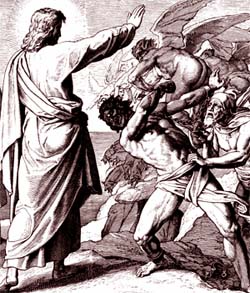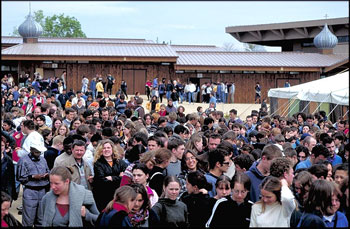|










|
|
- In the name of Jesus (Mark 9, 38-40)

|
-Master, said John to Jesus, we saw a man who does not
follow in our company casting out devils in your name and we
forbade him to do it. |
Jesus answered:
-Forbid him no more; no one who does a miracle in my name will
lightly speak evil of me . A man who is not against us is on
our side.
-
- Stay between us. Who is not in our company is not well
seen, whatever he does or whatever he says. He has not the right
to do like us, we have to forbid him. What is going on, what
will be left for us if anybody takes over our values and our
way of doing things? John, one of the twelve apostles, had an
understandable reaction in seeing this man casting out devils
in the name of Jesus. Only them can do these miracles. No way
would they share their knowledge and their power with unknown
persons, with foreigners. But Jesus does not want to be locked
up in the small group of the Twelve. The Twelve are not the owner
of Jesus.
-
|
Nobody can make own of Jesus: neither the group of baptized
people, nor the Roman Catholics. Jesus belongs to everybody. |

|
-
- He came for all and not for a few. Not willing to be monopolized,
he let himself be questioned by foreigners, sinners, and women:
Zachea the dishonest tax collector, the Channahon woman who is
only asking for crumbs, the adultery woman whom he does not condemn,
the Roman Centurion the faith of whom moves him… He saw
in these men and women that they are children of God, children
of Abraham as well as his Jewish brothers, faithful observers
of the Law. Thanks to their intervention in his life, the mission
of Jesus widened and went out of a close circle.
-
- Perhaps also, John thought that, being used by persons
considered as opposing to Jesus followers, the name of Jesus
was altered? Proclaiming the name of Jesus, it is proclaiming
the Good News: limpers are walking, deaf persons are hearing,
the blind are seeing, the devils are cast out… Also this
Good News is offered to all and not reserved for some. It is
its propagation, which is important whatever the way of its diffusion
is. Forbid them no more, says Jesus. In fact does the
Good News do something else than to liberate people from their
inner devils in which they are closed-in: uncontrolled impulses,
phobia, anguish…? There the essential is: make them standing
up to allow them to be reinserted into the social tissue. It
is the result that counts. Even if it is in a confused way, this
man seems to think that the name of Jesus is efficient to accomplish
his healing process, for that he follows the wish of God. He
is on our side Jesus notes.
-

|
Rejoice to see the words of the Gospel becoming vernacular
expressions; rejoice to see the Christian rites integrated into
the social life like Christmas for instance. |
-
- Rejoice to see the Catholic liturgies transformed by other
cultures. Rejoice to see the care for the poor by the humanitarian
organizations. Rejoice for the progress of science that contributes
to the improvement of human life. Rejoice to see humanity more
and more concerned about the fragility of our planet.
-
- Sure the Christians do not own any more these values and
they dangerously seem altered. It is the obligatory counterpart
of the wide diffusion of the Good News of which nobody is the
master. Only the results have to be examined. One recognizes
a tree to its fruits. If the fruits are those of liberation,
of healing, of progress of humanity, then rejoice because who
is not against us is for us.
|
